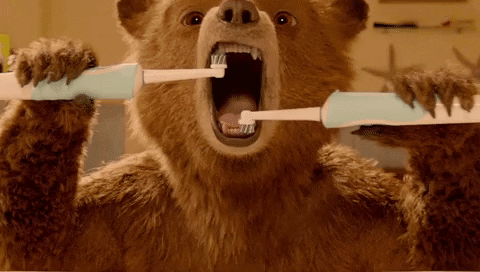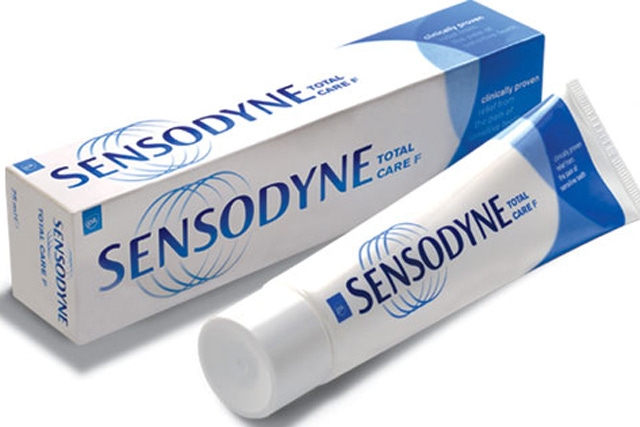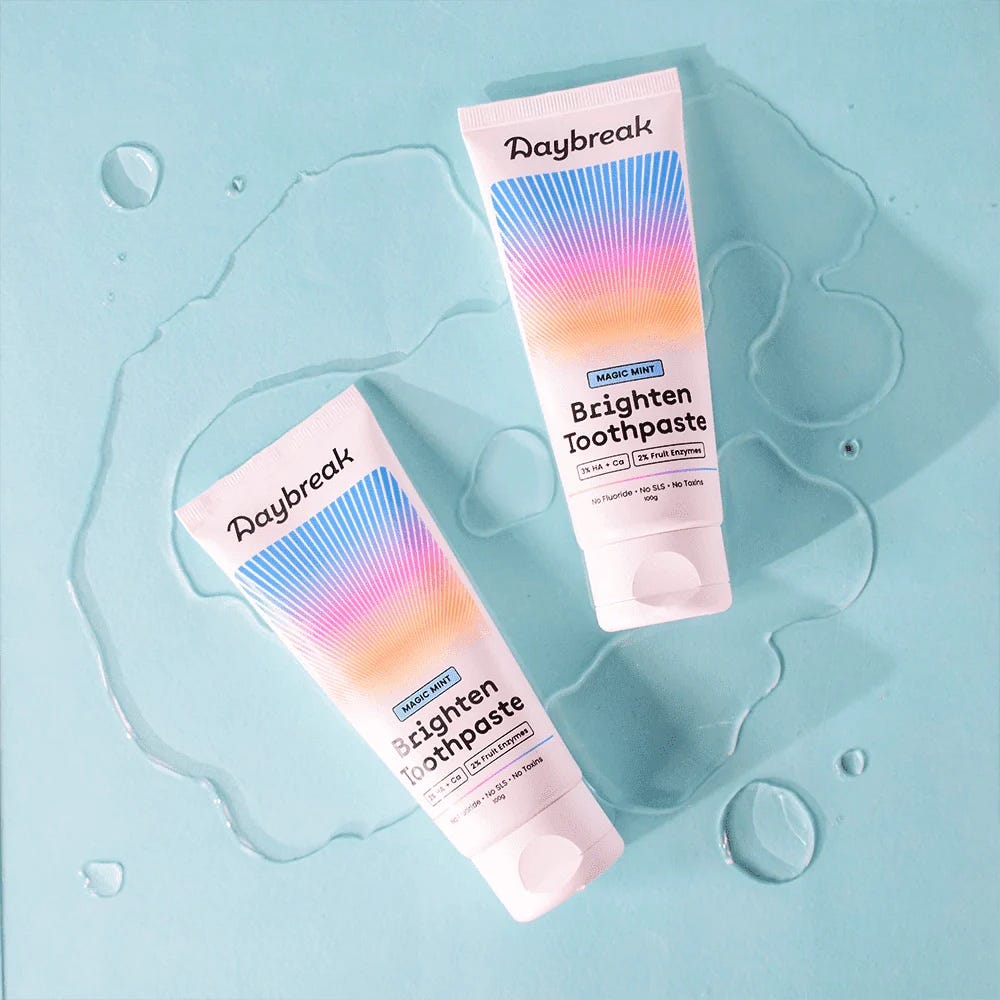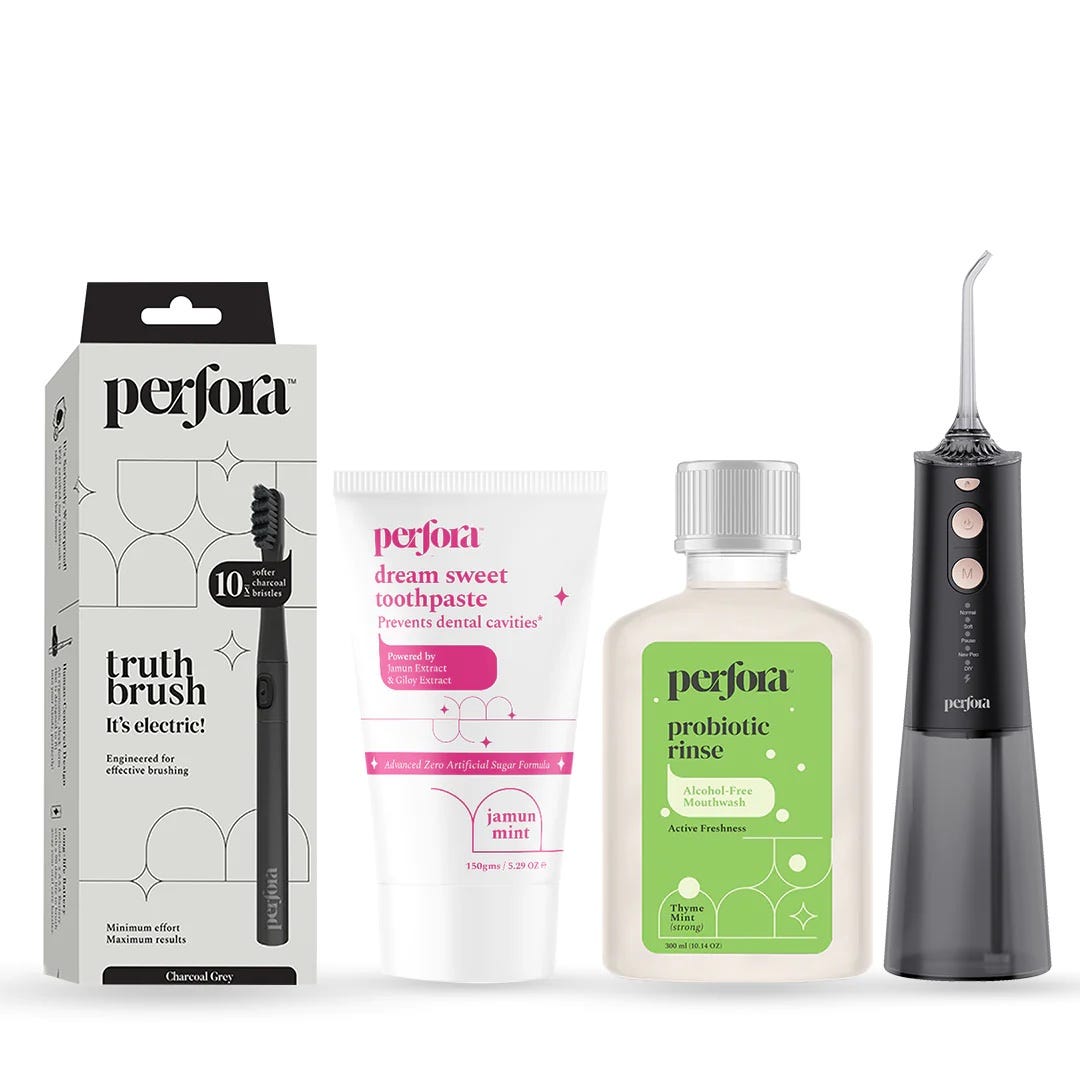Good day, folks.
Fifteen years ago, the only remotely close discussion on oral hygiene would’ve been between “Colgate vs Pepsodent.”
But today, when you ask a 29 year old in Bandra West, they have an oral care ‘routine’. Bougie but true. And everyone now cares about nano bristles that automatically clean your teeth and gums that need alkaline free, de-mineralising, sensitive mouth washes. And a whole lot more to keep your teeth sparkling clean, almost an embodiment of the big screen celebrities.
There’s been a surge in boutique oral care in India (feel free to call it luxury or premium oral care) and it’s a pretty interesting segment. Turning a rather boring necessity like brushing your teeth into an aspirational ritual is a pretty big task — but brands like Perfora, Salt, Daybreak and Fang Oral are spending BIGG bucks to build this category. And grabbing eyeballs and customers along the way.
Let’s dive in.
▶️ The standard: Legacy brands and low innovation.
Back in the day, you woke up, drank some water, went to the bathroom, and brushed your teeth. Not too much thought given to the instruments used - you just had to get it over and done with, and get on with the rest of your day.
The oral care market in India is worth a little over $1.8 billion and a big chunk of that is toothpaste.
Legacy brands like Colgate, Oral B, Pepsodent and Close Up (both Hindustan Unilever-owned, BTW) are still the norm in most homes in India, along with “natural” inclined brands like Dabur and Meswak.
The only disruptors to this market, if one can call it that, came with Sensodyne - designed specifically for sensitive teeth - and Baba Ramdev’s Patanjali, which married commerce with Ayurveda and spirituality to sell everything from instant noodles to toothpaste.
Toothpaste didn’t need to look good or have a personality. Innovation has also been pretty low in the space: the exceptions being salt in toothpaste (not exactly revolutionary) and toohbrushes with zig-zag or activated charcoal bristles.
The oral care industry was a mature one, but with low involvement — hence the lack of innovation and a level of complacency. Why fix what’s not broken?
▶️ The trend: “Premium-isation” of oral care.
The COVID-19 pandemic was one factor that transformed the nature of oral care. From being a boring essential, the category is now seen as an extension of overall health and beauty.
The oral care market was ripe for disruption when Perfora burst onto the scene in 2021, founded by Jatan Bawa and Tushar Khurana. The two zeroed in on oral care for a few specific reasons.
Oral care was something people used everyday.
It’s a space that has not seen major innovation in decades.
And, there were no brands that spoke to younger consumers in the Millennial and Gen Z bracket.
So it seemed like a good space to enter.
Perfora has so far raised $3.99 million in funding and was featured on Season 2 of Shark Tank India, and got a 3-Shark deal, with investors Peyush Bansal, CEO of Lenskart; Vineeta Singh, co-founder of Sugar Cosmetics; and Namita Thapar, ED, Emcure.
Within 9 months of Perfora’s appearance on Shark Tank India, their monthly sales accelerated from 70 lakhs to 3.5 crores. Which indicates that aggressive marketing aside, there clearly is a segment that wants to invest in oral care and doesn’t mind paying a premium.
Other brands in the fray include Daybreak, that believes in elevating your mornings with science-backed, dentist approved oral care products. Then there’s Salt Oral Care, with the tagline “rituals reimagined,” that marries science with sleek design to give consumers oral care products that have a spa-like look and feel. (Salt recently closed in on pre-seed funding via angel investors.)
There are 3 main factors driving the premium/boutique oral care market.
🤑 Young consumers: Data from Euromonitor shows that after Baby Boomers, Gen Z is spending the most on oral care. While Boomers are more invested in health and hygiene, Gen Z looks at oral health from the lens of aesthetics and beauty and buys into oral care products that are positioned as lifestyle and beauty essentials. (Kendal Jenner’s Moon Oral Care is a great example.) The Gen Z consumer segment is willing to spend more to look good - and also wants products that look good on their bathroom shelves.
🌱 Clean beauty trends: Much like the demand for cleaner, non-toxic ingredients in skincare, consumers today are more particular about what goes into their toothpaste. Fluoride-free formulations are sought after, as well as toothpastes devoid of triclosan (an antibacterial agent that can affect thyroid hormones) and SLS (a foaming agent that can cause gum irritation). Another DTC oral care brand, Fang, capitalises on this sentiment in their marketing communications.
🌍 Sustainability: For Gen Z and Millennials, sustainability and a lower carbon footprint matter when it comes down to making a purchase. As consumers have a better understanding around recycling and sustainable products and options, they are demanding the same from brands. From vegan formulations that have a lower carbon footprint (Daybreak) and eco-friendly packaging (Salt Oral Care) and a 1% pledge to the planet (Perfora) brands are incorporating sustainable practices into their premium positioning.
▶️ The trend: Design, DTC, distinct ingredients, diversification.
The key differentiators for these brands are design, a DTC model, distinct ingredients, and a diverse range of products.
🎨 Design: With Millennials and Gen Z as their target audience, brands understand that they need to have packaging and design that doesn’t just do the job, but also looks good on a bathroom shelf or a dresser. Plastic-free packaging (Salt Oral Care) personalisation (Perfora’s electric toothbrushes) and bright colours (Daybreak) make the products aspirational and flaunt-worthy, justifying the premium price tag.
🛒 DTC: Almost all the new-age oral care brands use a DTC (direct-to-consumer) model, and are listed on dozens of online marketplaces (including Sosh!) but they’re all online, rather than on shelves. Better digital penetration - from e-commerce marketplaces, to online payment tools - make it easier to reach more consumers via the DTC route.
👌 Distinct ingredients: Formulations are largely clean, devoid of toxins, and contain natural extracts which are marketed as hero ingredients: activated charcoal, grapefruit water, aloe vera, green tea extract, neem extract… the list goes on. The all-natural ingredients are the differentiator.
✅ Diversified: Boutique oral care brands are also clear about wanting consumers to build a full routine, moving beyond the toothbrush-and-toothpaste combo. Here’s what’s on offer: mouthwash, string floss, water flossers, teeth whitening pens and strips, and even a nice-to-have product like a toothpaste squeezer key (from Salt).
🤔 So…
There’s definitely plenty of steam left in boutique oral care.
Rising purchasing power among Millennials and Gen Z, coupled with the cool factor of buying not-your-average toothpaste and making oral care a ritual, much like skin and beauty.
So now, over to you… would you switch from your 150-rupee oral care routine with a brush, paste and mouthwash, to something that costs up to 2k, with an electric toothbrush, a flosser, vegan toothpaste and mouthwash?
Till next week,
Meenakshi
PS: If you’d like to browse through said boutique oral care brands, check out the dentist-approved curated collection on Sosh.















